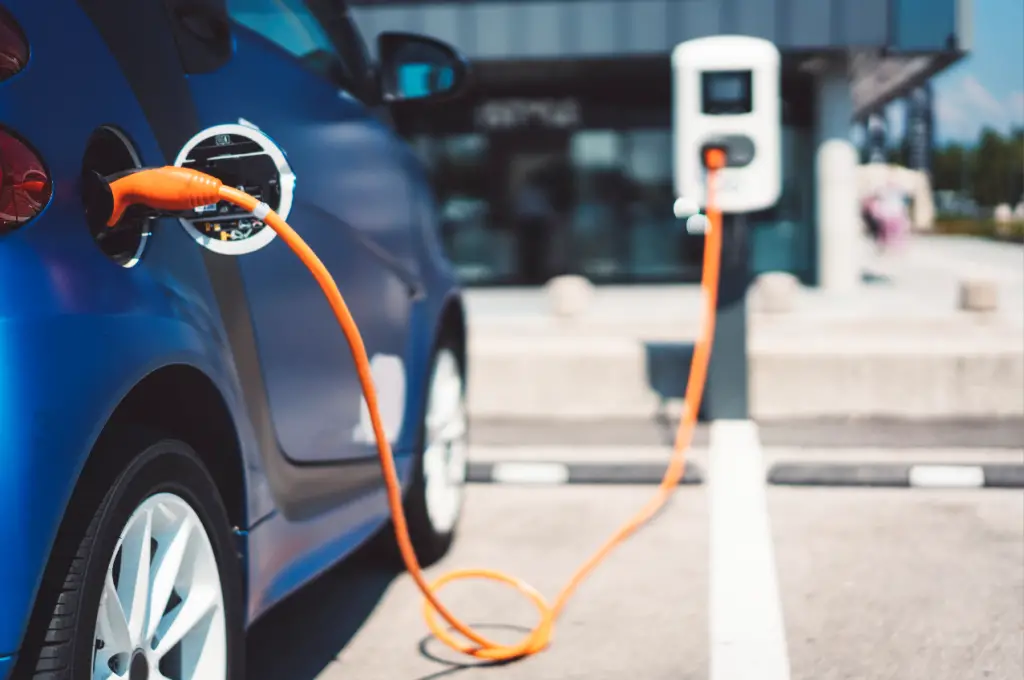Economic and air quality benefits of electric vehicles.
Electric vehicles provide economic benefits by reducing fuel costs and shifting consumptions away from imported oil to more locally produced electricity sources.


Electric vehicles provide economic benefits by reducing fuel costs and shifting consumptions away from imported oil to more locally produced electricity sources. The fuel savings become additional disposable income that will be spent mostly in the local economy hence creating additional jobs in the state.
Electric vehicles are attractive and eco-efficient alternatives to conventional vehicles. There are no tailpipe emissions for electric vehicles because they are propelled by electric motors instead of internal combustion engines, even though there are many obstacles related to technology and infrastructure against the widespread adoption of electric vehicles.
These challenges include lack of infrastructure for charging electric vehicles, charging time, driving range, high price, and uncertainties associated with the potential benefits of these vehicles. Electric vehicles have great potential to minimize the external impacts of road transportation, including air pollution and associated health impacts on urban population, global climate change, and many more. Therefore, electric vehicles would be one possible solution to help reduce air pollution caused by transportation.
Air quality is associated with health impacts for a long time. Much of air pollution comes from large-scale coal burning, but increasingly and especially in the largest urban areas, internal combustion engine vehicles (ICEVs) are to blame. Switching to an electric car can also save you around 1,000 per year although new and second-hand EVs tend to have a higher upfront cost than ICE cars, their running costs are far cheaper. And as EVs become more widely adopted they'll become more cost-competitive.
The mass adoption of electric cars will see the world benefit from cleaner towns and cities, improved quality of life, and huge cost savings. Drivers will not only save billions in fuel and motoring costs, but they will also benefit from a better driving experience and an increasingly convenient one. The infrastructure isn't perfect but it's improving, and the benefits are undeniable. We need to act now to cut emissions and all play our part. Protecting the health of those we love.
The benefits of electric vehicles ranges form individually to state, some of them are:
Job creation
As we know Africa produces oil and the oil sector plays a major role in economy however, shifting to electric does not mean the economy will be paralyzed. And for countries that impact oil, the money that will be saved because electricity is mostly produced from internal hence spending less disposable income on imported energy and more on local goods and services.
You might be aware the energy sector plays least role in employment-intensive sectors of the economy, therefore shifting to local goods and services will create more local jobs. These jobs created will be spread throughout the economy, not just on vehicle.
In 2012, Dr. David Roland-Holst, an economist at the University of California, Berkeley, analyzed the economic and job creation impact of two EV market penetration scenarios for California. The study focused on the impact of EV fuel savings on the California economy. This analysis found that, if EVs comprise 15.4 percent of new vehicle sales by 2030, then nearly 50,000 additional jobs would be created in California from the fuel savings.
Electric vehicles eliminate all toxic emissions from engines- Switching from an ICE to an EV car eliminates all toxic tailpipe pollution, e.g. NOx, HC, and carbon monoxide (CO). A harmful pollutant, nitrogen dioxide (NO2), is responsible for over 50,000 premature deaths per year in Europe. It causes respiratory and cardiovascular disease and can be a death sentence for those suffering from asthma.
ICE cars also emit other pollutants, less known but toxic and cancer-causing chemicals including benzene (C6H6) and polycyclic aromatic hydrocarbons (PAH). Carmakers themselves acknowledge that it is not possible to eliminate harmful emissions from the engines of fossil fuel vehicles. The only option is to switch from engines to electric motors, i.e. EVs. The sooner this happens, the sooner the air quality benefits will be felt across Europe.
Better for our energy security
Electric cars are easy to power from local renewable energy sources, reducing dependence on foreign oil. Electric vehicles will not be affected once the prices of oil keep disrupted.
EVs reduce particle pollution
Focusing on ‘primary’ particle mass (PM) emissions, i.e those particles which are emitted directly from the exhaust, tires, and brakes, should not lose sight of ‘secondary’ particle pollution. These particles form in the air due to other pollutants such as nitrogen oxides (NOx), hydrocarbons (HC), and ammonia (NH3) emitted from the tailpipe. Like primary particles, these ‘secondary’ particles also contribute to PM2.5 (particles smaller than 2.5 microns) and PM10 (particles smaller than 10 microns) pollution, thereby causing poor air quality.
According to a recent study by the Organization for Economic Co-operation and Development (OECD), these secondary particles can contribute up to 29% of the total PM emissions of a car. Most importantly, the OECD study found that when all particle sources associated with cars are counted, including secondary particles, EV cars contribute less PM2.5 and PM10 than diesel or petrol cars.
Better for the network
Charging electric vehicles should not be done during peak hours, but rather during off-peak when not so many people are using the electricity. It will help to create a flatter electricity network demand profile over a typical 24-hour period. By doing this it will help:-
- better utilize the electricity network
- help EV owners avoid higher-cost charging periods
- help the entire electricity system work more efficiently
- help support the integration of more small and large-scale renewable energy systems into the electricity grid.
Source:
i) Matteo. B (2021) Electric vehicles and air pollution: the claims and the facts
ii) Pippa. N (2021) The importance of switching electric vehicles




